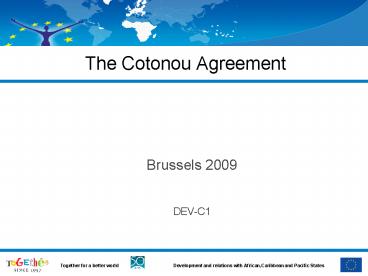The Cotonou Agreement - PowerPoint PPT Presentation
1 / 10
Title:
The Cotonou Agreement
Description:
Development and relations with African,Caribbean and Pacific States ... Signed in 2000 for ... until 2000 the Lom Conventions (Lom I Lom IV bis; 46 ... – PowerPoint PPT presentation
Number of Views:281
Avg rating:3.0/5.0
Title: The Cotonou Agreement
1
The Cotonou Agreement
- Brussels 2009
- DEV-C1
2
The Cotonou Agreement
- Signed in 2000 for a period of 20 years
- designed to establish a comprehensive
partnership, based on three complementary
pillars (i) development cooperation (ii)
economic and trade cooperation, and (iii) the
political dimension. - huge step forward in ACP-EU and North-South
relations. It is framing the relations with the
biggest development grouping in the world. It is
setting an innovative agenda in terms of
political dialogue, non-state actors
participation, trade and development and
performance based management.
3
Historical background
- The notion of "ACP States" goes back to the "ACP
Group of States", formally established in 1975
with the Georgetown Agreement (46 ACPs). Today,
the ACP Group of States counts 79 countries, 78
of them signatories of the Cotonou-Agreement
(with Cuba being the exception). - The special status of the ACP countries has to be
seen in the context of colonisation. Initially,
the EC Treaty provided for a special association
of the overseas countries and territories which
still belonged to some of the MS at that time
(mostly to FR), but not for development
cooperation. - More structured approach after decolonisation
with the successive Yaoundé Conventions (1963
1975 EEC plus 18 African States) and from 1975
until 2000 the Lomé Conventions (Lomé I Lomé IV
bis 46 states, incl former British colonies). - Conclusion of the Cotonou Agreement in 2000 (78
ACP States).
4
The Cotonou Agreement objectives and principles
- Objectives
- The partnership is centred on the objective of
reducing and eventually eradicating poverty
consistent with the objectives of sustainable
development and the gradual integration of the
ACP countries into the world economy (Art. 1 of
Cotonou Agreement). - Fundamental principles
- - equality of the partners and ownership of the
development strategies - - participation (central governments as the main
partners, partnership open to different kinds of
other actors) - - pivotal role of dialogue and the fulfilment of
mutual obligations - - differentiation and regionalisation
- The actors of the Partnership
- - States (authorities and/or organisations of
states at local, national and regional level) - - Non-state actors (private sector economic and
social partners, including trade union
organisations, civil society in all its forms
according to national characteristics). - Institutional set-up Joint ACP-EC Institutions
5
Cotonou Agreement- Implementation
- The European Development Fund (EDF) is the main
instrument for providing Community assistance for
development cooperation under the Cotonou
Agreement. The EDF is funded by the EU Member
State on the basis of specific contribution keys.
Each EDF is concluded for a multi-annual period. - The 10th EDF covers the period from 2008 to 2013
and has been allocated 22.7 billion it was
established between the EU Member States by
Internal Agreement. - The cooperation with the ACP States funded from
the EDF is complemented by development
cooperation funded from the EC budget, notably
through the Development Cooperation Instrument,
the Instrument for Stability, the European
Instrument for Democracy and Human Rights and the
European Humanitarian Aid Instrument.
6
The 1st revision of the Cotonou Agreement
- Calendar
- Negotiations concluded February 2005
- Revision signed July 2005
- Entry into force July 2008 (27 EU MS 2/3 ACP)
- Today 5 ACP have not yet deposited ratification
instruments - (AB, Comoros, Nigeria, Sudan South Africa)
- Main changes
- Political dimension
- Article 8 dialogue article 96 ( Annex VII)
consultation process - Article 11/11a/11b peace, international
justice, terrorism, WMD - Development cooperation provisions
- Eligibility for financing expanded to local
authorities, Parliaments, NSA and non-ACP States
participating in regional organisations with ACP
(Art. 58 annex IV, art. 4/15) - Increased flexibility to increase allocations in
case of special needs (Annex IV, art. 3.5) and to
take over role of NAO in crisis situations (Annex
IV, art. 4.5) - More strategic role for the NAO (Annex IV, art.
35) - Slight broadening of scope of Investment
Facility (Annex II)
7
The 2nd revision of the Cotonou Agreement
- Calendar
- Commission proposal for a negotiation mandate
(adopted in February 09 by Council) - Notification by ACP and EC side before 1st of
March 2009 - May 2009 official start of negotiations
- Conclusion negotiations lt 28.02.2010
- Ratification /- 18-24 months after signature
8
The 2nd revision of the Cotonou Agreement
- Trends towards regionalisation
- Regional integration and trade cooperation
- EPA
- regional cooperation with non-ACP
- EU-Africa strategic partnership
- Pacific and Caribbean strategies
- ? principles of reciprocity and proportionality
- ? increased differentiation vs ACP unity
- Political dimension
- security development
- governance
- situations of fragility (art 72-73)
- migration
9
The 2nd revision of the Cotonou Agreement
- European consensus
- MDGs
- cross-cutting issues (human rights, gender,
environment, HIV/Aids) - Aid effectiveness
- explicit reference to the 5 pillars ownership,
alignment, donor coordination, management for
results, mutual accountability - joint programming and division of labour
- update of conditions for granting budget support
- untying of aid
- participatory approaches, enhanced role
Parliaments - Policy coherence for development
- domestic policy coherence ACP (in political
dialogue) (art 8.3) - importance of policies other than development
(art 12)
10
The 2nd revision of the Cotonou Agreement
- ACP side
- notified three big themes for review
- - political dimension and sectoral policies
- - regional integration and trade
- - development finance cooperation.
- - Concerns about the future of the partnership
and the unity of the ACP - budgetisation
- regional cooperation with non-ACP
- Concerns about the implementation of the
political dialogue

